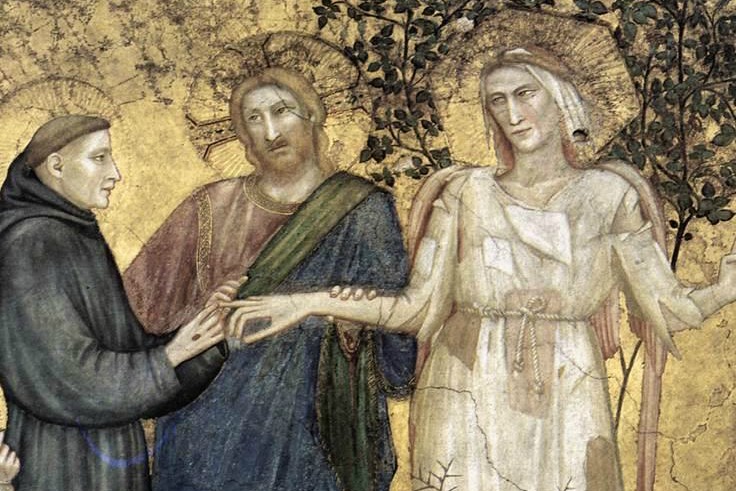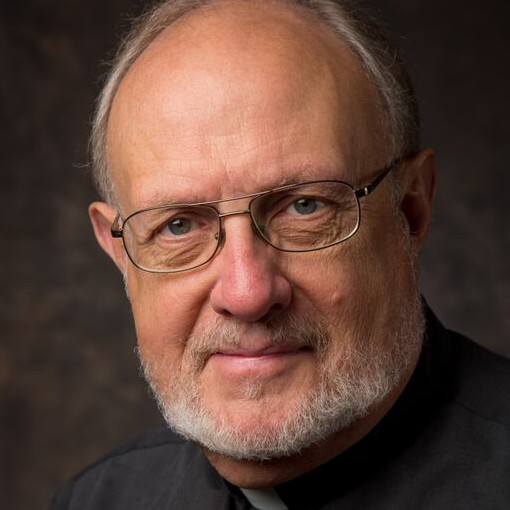One way that people dedicate or devote themselves to another, a way by which they give themselves away, is in the Sacrament of Matrimony. Another way—the way which will provide the focus of this article—is in the vows which incorporate men and women into various sorts of religious orders, congregations, and other pious institutes. These vows and this incorporation are not a sacrament, but the person involved can live this dedication just as seriously and with just as much love and joy as a married person lives his or her commitment.
For religious such as myself, these vows are fundamentally a matter of hope. This hope is not a vague or formless attitude of “whatever,” not an inattentiveness to the realities of life, but a personal, active, and complete trust in the Father’s love for us as we try to imitate the Son as the Spirit directs and strengthens us to do. This is a complete abandonment of ourselves to the Trinity in loving gratitude and gift, imitating the “kenosis” of Christ which St. Paul describes in Philippians 2:5–11.
Each religious family has a different understanding and practice of the vows of poverty, obedience, and chastity, and these understandings can change over time, which is one reason why Vatican II called for religious orders to return to their institutes’ original inspiration and spirituality. Nonetheless, I would like to offer an interpretation of the vows which might apply to the vows in every religious body, or might at least enrich our understanding of them for all of us.
I believe that the essential vow is poverty, not simply regarding things, but concerning absolutely everything that comes our way, including the gifts of God and our very selves. Perfect poverty is for us to unceasingly hold everything we are or have in our open hands for God to use, remove, or alter as he would wish (“Your Kingdom come, Your will be done . . .”), but we also recognize that he also has perfect freedom to add to them as well. Such open-handedness on our part is the pinnacle of utter hope in God alone, of generosity, and of a grateful and respectful love. Let me just point to the example of John the Baptist, who drew people to himself because of his utter poverty: it was clear to all that everything he was and all that he had come from God, and this is what people sought in him (Mt 21:25; Lk 7:25 and 20:4).
I would call most special attention, though, to the fact that such hope in God does not mean that we rely on God only for the positive and welcome of his gifts, but also for the more demanding ones. We must seek to actively and joyfully welcome even such things as sickness, diminishment, loss, being misunderstood, and feeling ignored and unloved if that is what God sends us in his wise and powerful love, and we must do so precisely because we believe deeply and beyond all doubt that our Father would never give us a scorpion if we ask for bread, a stone if we ask for an egg (Lk 11:11–12). If this is what we get, this is what God thinks is best for us. Period. In our hope we trust him, joyfully, prayerfully, and gratefully: all that God gives us is for our good, all is loving gift whether we would ask for it or not, and so living such a poverty is a matter of hope.
Obedience, a second vow, is the way that we play out this attitude of hope and poverty in regard to our will and self-determination, leaving ourselves completely open to God’s call and direction. Mary’s response to Gabriel was this simple and trusting obedience of a “handmaid,” as she puts it at the Annunciation, and in her openness God was able to do great things through her (Lk 1:38, 49).
If we wish to give any real depth to our obedience, however, we must enter into a spirit of discernment. Absolutely “blind” obedience is acting without discernment, often missing the true intent of what God is asking of us through others. God is not asking us to become robots, only following our programming; that is not real obedience or service. Discernment looks not at the words of what we are asked to do and no further. It considers what our religious community or our superior is trying to achieve, the possible obstacles or hindrances in the situation or in ourselves, and anything else which might have a bearing on our following through, and it leads us to represent the results of our prayerful reflection and discernment to our superiors so that she or he might alter their instructions if they think best. We are bent only on carrying out the full and deepest desires of those who direct us so that we might be completely dedicated to whatever the task is, without reservations or a mistaken interpretation. All we wish is to serve God with our whole heart, mind, and energy.
We may still do exactly what we are asked to do, but doing so after discernment makes our obedience a far greater gift. We also need to seek generosity, courage, and humility in becoming obedient. This is all one way of dispossessing ourselves of self in poverty and in hope.
Our vow of chastity, finally, is not merely a matter of refraining from any sort of sexual activity, licit or otherwise. It is primarily leaving ourselves open to love many people instead of devoting ourselves to only one. We make God the one to whom we dedicate our principal affection and so find love for all our brothers and sisters in him (Mt 19:29).
Such love is a two-way proposition, though, since—as we progressively open ourselves to loving all people as brothers and sisters—we also open ourselves to knowing and experiencing that others love us. This property of love, working simultaneously in two directions, is also apparent in our relationship with God, which is very much a matter of how well we try to love others: the more we reach out to them humbly, generously, patiently, and tenderly, the more we find ourselves aware of loving God and aware of how much and in how many ways God is loving us. If we show mercy we will appreciate God’s mercy for us much better and love him even more; if we learn patience and tenderness in caring for those God puts in our lives or asks us to seek out, we shall see how he works with us and be better able to imitate his tender and patient way of caring.
We might say that at root there are only three people in the world—God, myself, and everyone else—and the way that I treat any one of these affects quite seriously everything in my relationships with each of the other two. The way we each live our poverty, our obedience, and our chastity is at the heart of our life in God and is the basis of our love and service of others; it is also a way of life which we embrace lovingly as a personally appropriate spirituality and mode of life for our return to God.
We need to remember, in spite of all this, that we are merely human and therefore cannot make this surrender absolutely and irrevocably; we will spend the rest of our days on earth in trying to live up to the measure of that gift. We will necessarily do so unsuccessfully but will, at our best, constantly advance toward that goal. While I suggest, then, that these vows are a matter of surrendering control of our lives, our very selves, in a formal way, I stress that our surrender is rooted in a love of God and in a poverty born of our hope in him which will transform us as we can not do for ourselves. It will be God changing us by his holy presence, attention, and love.
It is a matter of hope and not of merit or worthiness on our side that we trust God to work the reconciliation, healing, and restoration to innocence which we seek. Living with such hope means that we find and serve God right there in our weakness, poverty, and absolute abandonment to his love, for that is where Christ finds us (Mk 2:17; Lk 5:31).
![]()
Featured Image: Giotto (1266–1337), Franciscan Allegories: Allegory of Poverty, detail (ca. 1330); courtesy of Wikimedia Commons.



